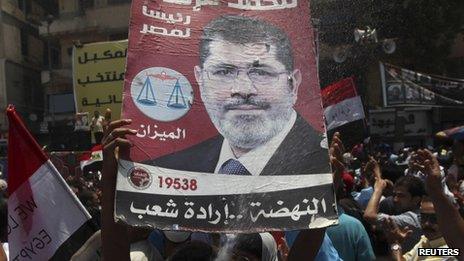Egypt's president-elect Mursi begins work on government
- Published
- comments

Mursi supporters continued their celebrations during the day in Cairo
Egypt's president-elect, Mohammed Mursi, has moved into his new office in the presidential palace and begun work forming a government he says will represent all of the people.
The Muslim Brotherhood candidate, who defeated ex-PM Ahmed Shafiq, could be sworn in by the end of the month.
However, the ruling military council has taken many presidential powers and questions about his authority remain.
A new constitution, the economy and security will be his main priorities.
'Stability'
The prime minister appointed by the military rulers, Kamal el-Ganzouri, met Mr Mursi on Monday to resign formally and assume caretaker duties until the new president's team is in place.
One of Mr Mursi's campaign spokeswomen, Nermine Mohammed Hassan, told Agence France-Presse: "He has already started with a list of names he is considering. He says he will declare the cabinet soon."
Another Mursi spokesman, Yasser Ali, said the president's key concern was political stability.
State television showed Mr Mursi meeting on Monday with Field Marshal Mohamed Hussein Tantawi, the head of the ruling military council, the Supreme Council of the Armed Forces (Scaf).
Field Marshal Tantawi said the military would "stand by the elected, legitimate president and will cooperate with him for the stability of the country".
Mr Mursi has promised to appoint a range of vice presidents and a cabinet of "all the talents".
One key point of discussion with the Scaf will be the court-ordered dissolution of the Muslim Brotherhood-dominated parliament, which happened days before the presidential run-off vote.
Because of the dissolution of parliament, it is unclear where the new president will take his oath of office.
The Muslim Brotherhood has been seeking a partial recall of parliament so that he is sworn in before MPs. However, the Mena news agency quoted a Muslim Brotherhood spokesman as saying the oath would be taken before the Supreme Constitutional Court.
Emad Abdel-Ghaffour, head of the ultra-conservative Islamist al-Nour party, told Associated Press that although the election result had eased the tension, there was still much mediation needed between the Islamists and the Scaf on the president's powers.
The Scaf has led Egypt since last year's revolution and issued a series of recent decrees:
The justice ministry gave soldiers the right to arrest civilians for trial in military courts until the ratification of a new constitution
A decree was issued dissolving parliament after a court ruling that the law on elections to the lower house of parliament was invalid
The Scaf granted itself legislative powers and reinforced its role in the drafting of a permanent constitution
Field Marshal Tantawi announced the re-establishment of a National Defence Council, putting the generals in charge of Egypt's national security policy
Shares on Egypt's main EGX30 index soared on Monday in the first trading since the results were announced, sparking a half-hour suspension. The halt in trading is triggered by a mechanism designed to prevent market fluctuations greater than 5%.
Gains continued on the restart, with the EGX30 on the Egyptian Exchange, external closing 7.6% up.
'Milestone'
In his victory speech on Sunday, Mr Mursi, 60, urged Egyptians "to strengthen our national unity" and promised an inclusive presidency.
"There is no room now for the language of confrontation," he said, after the election authorities declared that he had won 51.73% in the 16-17 June presidential run-off.
Mohammed Mursi: ''The revolution goes on, until all the objectives of the revolution are achieved''
On hearing the news of his victory, tens of thousands of Muslim Brotherhood supporters cheered in Cairo's Tahrir Square, chanting, "Down with military rule!".
Celebrations continued into Monday, with some protesters saying they would not leave the square until parliament was reinstated.
Mr Mursi paid tribute to the protesters who died in last year's uprising against former President Hosni Mubarak but also praised the role of Egypt's powerful armed forces.
He also said he would honour international treaties.
Responding to Mr Mursi's election, the White House called the result "a milestone for Egypt's transition to democracy", external.
Israeli Prime Minister Benjamin Netanyahu said on Monday: "We expect to work together with the new administration on the basis of our peace treaty."
There was confusion over an alleged interview quoted by Iran's semi-official Fars news agency. Fars said Mr Mursi planned to expand relations with Iran to "create a balance of pressure in the region", but Mr Mursi's spokesman denied the interview had taken place.